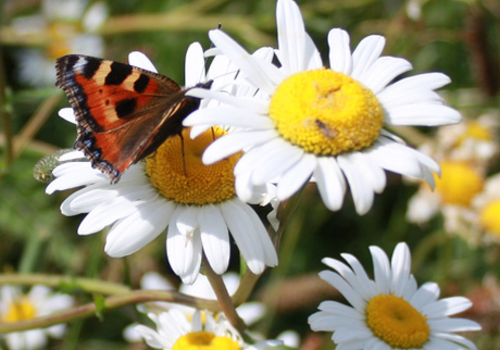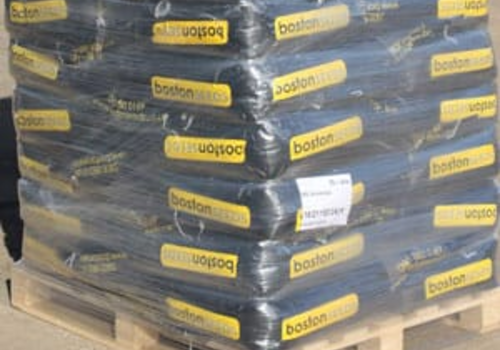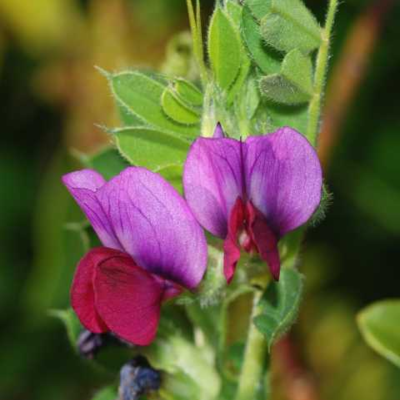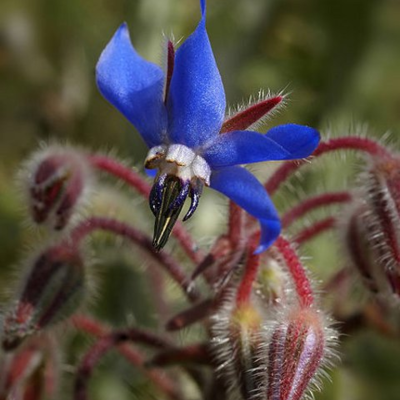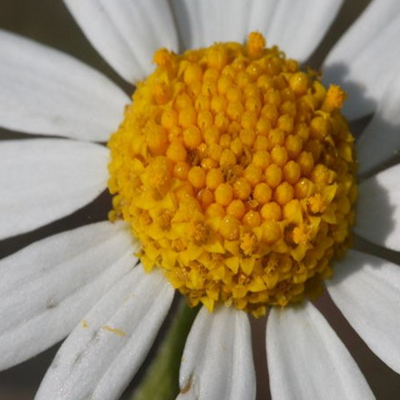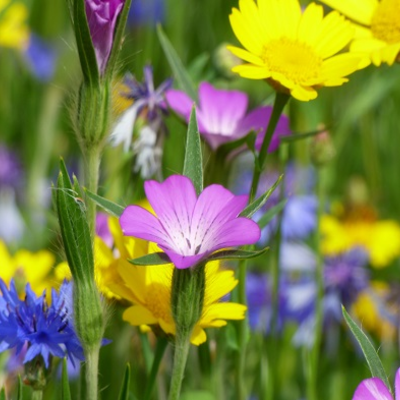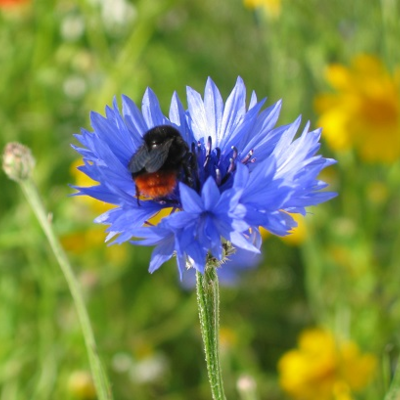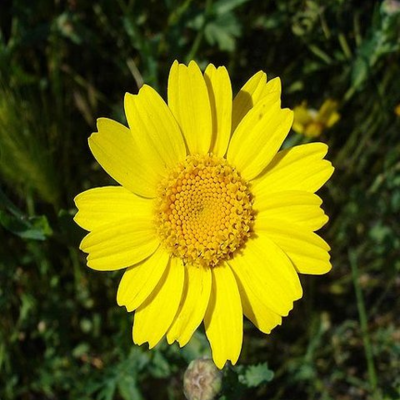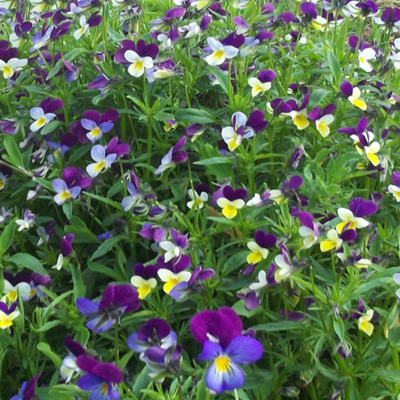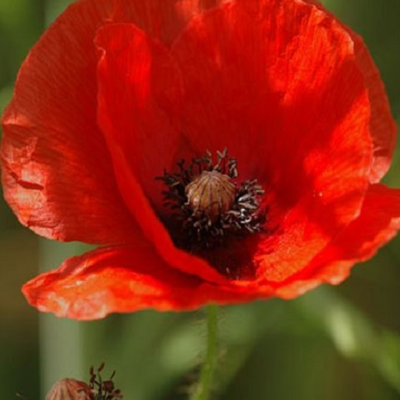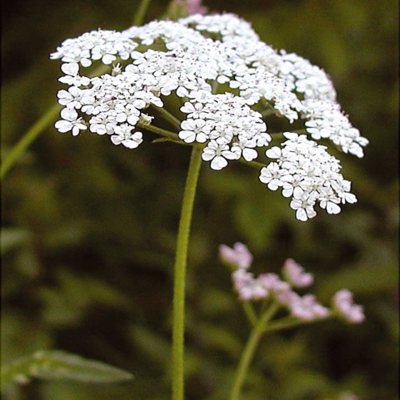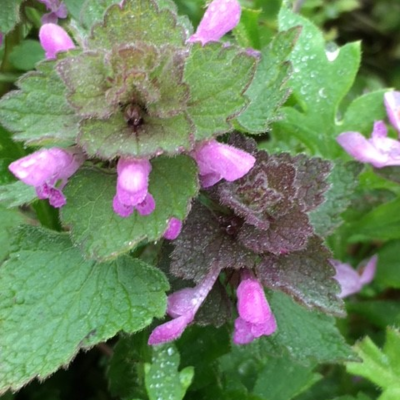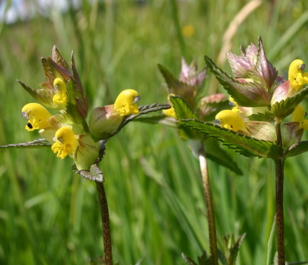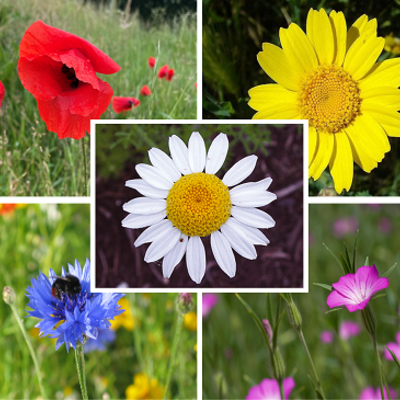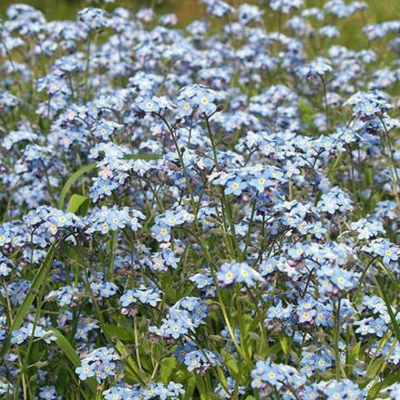Annual Wildflower Plants
Annual wildflower plants let you easily create a splash of colour in your garden. Explore our range of wildflower plug plants, including bright poppies, delicate yellow rattles and the whimsical borage. Our wildflowers are dispatched from April onwards and will help you kickstart your very own wildflower meadow ready for summer. Looking for the full range? Click here to see our full selection of over 100 species.
First time creating your own wildflower garden? Check out our helpful guide on how to establish your wildflower garden and how to maintain wildflowers once they’re planted.
Don't hesitate to get in touch to speak to one of our experts or request a catalogue to view our full range. Ordering regularly or looking for large volumes? Click here to apply for a trade account today - we review all applications within one working day.

Plants for Pollinators highlights plants selected by the RHS as scientifically proven to tackle the declines in bees, butterflies and other pollinators.
These climbing woodland legumes have an earnest and delicate charm not seen in others of its kind: its small, two-tone, pea-like petals in rich pink and purple look a bit like butterflies, which may be why they're so attractive to pollinators.
- Type: Annual
- Height: 45–75cm.
- Flowers: June-September
- Soil Requirement: Well-drained
- Light Requirement: Full sun
- Natural Habitat: Grasslands, verges, coastal areas
- Also known as: Fetch, Lintels

Plants for Pollinators highlights plants selected by the RHS as scientifically proven to tackle the declines in bees, butterflies and other pollinators.
Spice up your garden with the quirky colours of the Borage. Its brilliant blue, star-shaped flowers and hairy, scarlet stems are attractive to pollinators and easy to grow with minimal fuss.
- Type: Annual
- Height: 30-60cm.
- Flowers: June-September
- Soil Requirement: Well-drained
- Light Requirement: Full sun or partial shade
- Natural Habitat: Forest verges, meadows
- Also known as: Starflower Cool Tankard, Tailwort

Plants for Pollinators highlights plants selected by the RHS as scientifically proven to tackle the declines in bees, butterflies and other pollinators.
The Corn Chamomile's daisy-like flowers are well-known for their attractive aroma that's been compared to apples, and make them perfect for pollinators. A flower that's easy to care for, with a lot more charm hiding beneath its simple appearance.
- Type: Annual
- Height: 20-30cm.
- Flowers: May-July
- Soil Requirement: Well-drained
- Light Requirement: Full sun
- Natural Habitat: Grasslands
- Also known as: Mayweed, Field Chamomile

Plants for Pollinators highlights plants selected by the RHS as scientifically proven to tackle the declines in bees, butterflies and other pollinators.
Producing magenta and white petals, interspersed with rich indigo veins, these tall, hairy stems of summertime splendour make for a magical meadow flower, especially planted alongside poppies or ox-eye daisies.
- Type: Annual
- Height: 60-120cm.
- Flowers: June-August
- Soil Requirement: Well-drained, sandy
- Light Requirement: Full sun
- Natural Habitat: Grasslands, roadsides
- Also known as: Cat’s Eyes, Kiss-Me-Quick

Plants for Pollinators highlights plants selected by the RHS as scientifically proven to tackle the declines in bees, butterflies and other pollinators.
These feathery flowers produce pale blue petals tinted with purple - a colour so nice, it's called 'cornflower blue'! Highly attractive to pollinators, and its unique, crisp colouration lends itself to many combinations.
- Type: Annual
- Height: 30-60cm.
- Flowers: June-August
- Soil Requirement: Well-drained
- Light Requirement: Full sun
- Natural Habitat: Grasslands, farmland
- Also known as: Bachelor’s Button

Plants for Pollinators highlights plants selected by the RHS as scientifically proven to tackle the declines in bees, butterflies and other pollinators.
These vibrant yellow flowers make for an ideal choice for beds, borders, or even lawns: its bright colour and subtle, sweet scent helps to attract bees and butterflies.
- Type: Annual
- Height: 15-45cm.
- Flowers: June-October
- Best Sown: Spring
- Soil Requirement: Well-drained
- Light Requirement: Full sun
- Natural Habitat: Hedgerows, meadows
- Also known as: Guild Weed, Yellow Daisy, Yellow Ox-Eye
A famous subject mentioned in Shakespearian stageplay, this lovely, hardy and hearty flower truly is the perfect colour of a midsummer night’s dream, with heart-shaped white or yellow petals stained purple in the centre, supposedly from being hit by one of Cupid’s arrows. The unique, whiskery patterns on each pansy are easy to fall in love with, and make for a spellbinding spectacle when scattered in borders or rockeries.
- Type: Annual
- Height: 15-30cm.
- Flowers: April-June
- Soil Requirement: Moist but well-drained
- Light Requirement: Full sun
- Natural Habitat: Grasslands, dry meadows, rocky outcrops
- Also known as: Cupid’s Flower, Heartsease, Love-In-Idleness

Plants for Pollinators highlights plants selected by the RHS as scientifically proven to tackle the declines in bees, butterflies and other pollinators.
Scarlet, saucer-shaped, 4-petalled flowers used across the country and beyond as a symbol of remembrance for soldiers lost in the Great War. A hardy annual that self-seeds readily, its vibrant colours are a valuable addition for wild meadows, beds, borders and cottage gardens.
- Type: Annual
- Height: 30-60cm.
- Flowers: May-July
- Soil Requirement: Well-drained
- Light Requirement: Full sun
- Natural Habitat: Grasslands, farmland, roadsides
- Also known as: Blind-Eyes, Flanders Poppy, Headache Plant
This is a medium to tall in height hairy plant that can stand around 1.5 meters tall. The flower colours can vary from a deep pink-purple to a pale pink-white.
- Type: Annual or Biennial
- Height: 60-120cm
- Flowers: July - September
- Soil requirement: Neutral, well-drained, dry soils
- Light requirement: Full sun or partial shade
- Natural habitat: Woodland edges, ungrazed pasture, embankment
Although similar in looks to the stinging nettle, Red Deadnettle has harmless, heart-shaped foliage with a purple tint. As an early-blooming plant, these whorls of hooded flowers in ruby red to pinkish-purple are a prominent source of early pollen for bees as they build up their nest.
- Type: Annual
- Height: 5-30cm.
- Flowers: March - October
- Soil requirement: Moist
- Light requirement: Full sun, partial shade
- Natural habitat: Waste grounds, field edges, roadside verges
- Also known as: Purple Deadnettle, Purple Archangel

Plants for Pollinators highlights plants selected by the RHS as scientifically proven to tackle the declines in bees, butterflies and other pollinators.
Designed specifically to produce yellow rattle plants easily and quickly. Grown from our own quality-assured, fresh, UK native seed, our yellow rattle plugs are ready to be planted in your garden or meadow immediately upon on arrival in April.
Yellow rattle is a surprisingly musical meadow flower and a must for a wildflower garden: as a semi-parasitic plant, it requires robust neighbour plants like grasses and legumes, but also acts as a watchdog against vigorous weeds.. That's on top of the beauty of its golden, bell-shaped flowers, complete with a charming 'chime' as its ripened seed pods rattle in the breeze.
Our yellow rattle plug plants are grown from high-quality, British seed from wild meadow collections, and arrive ready to be planted complete with the essential meadow grasses.
- Type: Annual
- Height: 20–50cm.
- Flowers: May-September
- Soil Requirement: Moist or well-drained
- Light Requirement: Full sun
- Natural Habitat: Grassland, meadows
- Also known as: Corn Rattle, Hay Rattle, Penny Grass
Create bright, vibrant swathes of colour in your garden and borders with our Annual Wildflower Plant Collection. Annual species to attract a wide range of pollinators and beneficial insects. Includes equal quantities of the below species:
- Poppy: flowers May-July
- Corn Chamomile: flowers May-July
- Corn Marigold: flowers June-October
- Cornflower: flowers June-August
- Corncockle: flowers June-August
There is something strangely unforgettable about this flower’s simple-but-unique tiny, baby-blue blooms with rare bursts of pink, and silvery foliage. They’re also perfect for pollinators and have a knack for self-seeding.
- Type: Annual
- Height: 7-25cm.
- Flowers: April-October
- Best Sown: Autumn
- Soil Requirement: Well-drained
- Light Requirement: Full sun
- Natural Habitat: Road-sides, dry grasslands
- Also known as: Blue Mouse-Ear, Scorpion Grass
This item is currently unavailable
Wildflower plants are an especially popular choice for those looking to quickly add some biodiversity to their garden. A wildflower garden, even in just a small area, creates a rich habitat for insects and other wildlife. Many wildflowers provide a valuable source of food for pollinators, such as bees - so not only will you have a beautiful garden, you’ll have a helpful one.
We also have a wide range of wildflower seeds and wildflower bulbs to keep your garden looking wonderful in every season.
Check out our range of fertilisers to make sure your garden has all the nutrients you need to create a thriving hub of colour and wildlife.
Buy With Confidence

